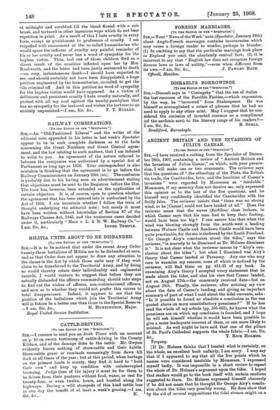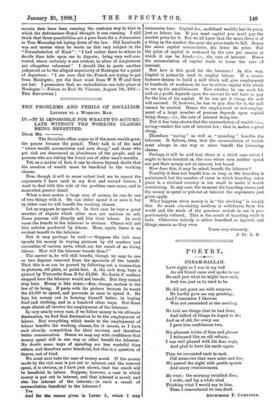ANCIENT BRITAIN AND THE INVASIONS OF JTTLIUS CAESAR.
[To THE EDITOR OF THE "SPECTATOR."] SIR,—I have received a cutting from the Spectator of Decem- ber 28th, 1907, containing a review of "Ancient Britain and the Invasions of Julius Caesar," on which, with your permis- sion, I will make one or two comments. The reviewer says that the questions of " the ethnology of the Picts, the British tin trade, the Cassiterides, Ictis, and the localities of Caesar's invasions" were regarded by Mommsen as "insoluble." Mommsen, if my memory does not deceive me, only expressed this opinion as to the last of the five questions, and he himself very confidently identified the Cassiterides with the Scilly Isles. The reviewer insists that "there was no strong wind, or he [Caesar] could not have landed at all." Does the reviewer mean that the waves (fluctibus) close inshore, in which Caesar says that his men had to keep their footing, would have been too big ? I can assure him that when the wind was blowing strongly from the south-west a landing between Walmer Castle and Sandown Castle would have been quite practicable, for the sea is sheltered by the South Foreland. "Sir George Airy's conclusion about the tides," says the reviewer, "is scarcely to be dismissed as Dr. Holmes dismisses it." It is not clear what the reviewer means by "Airy's con- clusion about the tides "; but what I dismissed was Airy's theory that Caesar landed at Pevensey. Any one who may care to examine my reasons, none of which is noticed by the reviewer, will find them on pp. 611-21 of my book. In examining Airy's theory I accepted every statement that he made about the tides, and also his view that Caesar landed, not on August 27th—the commonly received date—but on August 28th. Finally, the reviewer, after noticing my view about the date of Caesar's landing, and giving an imperfect summary of part of what I said about the tidal currents, asks : "Is it possible to found so absolute a conclusion as the one quoted above on more unsatisfactory premisses?" If he has read the whole of my article (pp. 595-665), he knows what the premisses are on which my conclusion is founded, and I hope he will ask himself whether it would have been possible to give a more inadequate account of them, or one more likely, to mislead. As well might he have said that one of the pillars of St. Paul's Cathedral supports the whole fabric.—I am, Sir, T. RICE HOLMES.
Torquay.
[If Dr. Holmes thinks that I treated what is certainly, on the whole, an excellent book unfairly, I am sorry. I may say that if I appeared to say that all the five points which he names were considered insoluble by Mommsen, I expressed myself badly. It was impossible in a short review to repeat the whole of Dr. Holmes's argument upon the tides. I hoped that readers would go to the book itself with certain cautions suggested to them. Dr. Holmes expressed himself obscurely if he did not mean that he thought Sir George Airy's conclu- sion about the tides very possibly wrong. He does show that by the aid of several suppositions the tidal stream might on a 'certain date have been running the contrary way to that in which the Astronomer-Royal thought it was running. I still think that these possibilities are a poor basis for a Johnsonian or Toni Macaulay-ish laying down of the law. Old Lambarde was not unwise when he wrote on this very subject in the " Perambulation of Kent" : "I had' rather leave to others to .decide than take upon me to dispute; being very well con- tented, where certainty is not evident, to allow of conjectures not altogether vehement." I should like to quote another judgment as to the alleged superiority of Boulogne for a point of departure : " I am sure that the French are trying to get from Boulogne ; yet the least wind from W N W and they are lost. I pronounce that no embarkation can take place at Boulogne."—Nelson to Earl St. Vincent, August 7th, 1801.— THE REVIEWER.]





















































 Previous page
Previous page